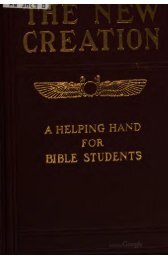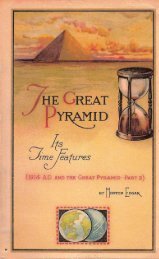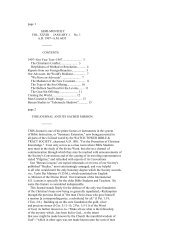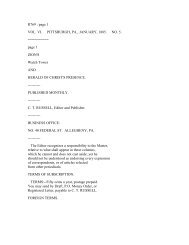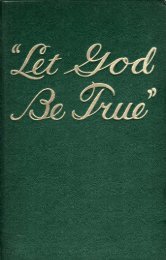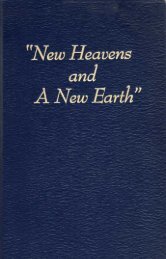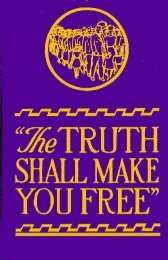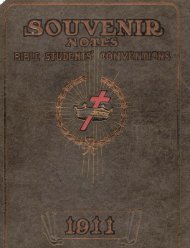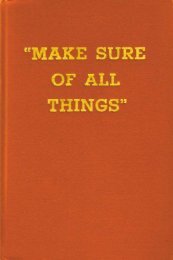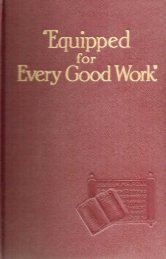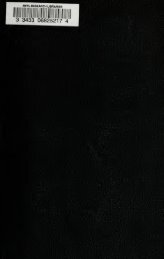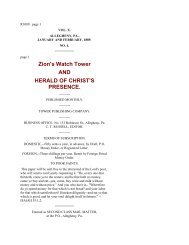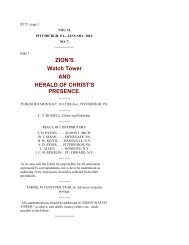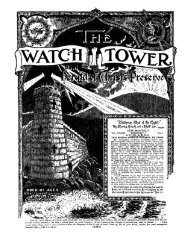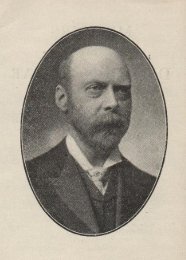1917 Watchtower Bible Student Schism - A2Z.org
1917 Watchtower Bible Student Schism - A2Z.org
1917 Watchtower Bible Student Schism - A2Z.org
You also want an ePaper? Increase the reach of your titles
YUMPU automatically turns print PDFs into web optimized ePapers that Google loves.
LIGHT AFTER DARKNESS<br />
was termed a bomb, which was to be exploded upon his<br />
return from the West-this in spite of his telegram that<br />
matters would be properly adjusted upon his return about<br />
the 18th.<br />
The -brethren asked what he could do, as they had<br />
heard he thought of working the affairs through some rival<br />
Society altogether. I told them that they were the duly<br />
recognized authority entitled to control affairs and I did<br />
not see how he could do anything very serious when they<br />
were acting lawfully. I could hardly believe that the<br />
friends would prefer to allow Brother Rutherford to act<br />
illegally and disregard the law, acting as if the opinion of a<br />
lawyer was the judgment of a Court, and would stand by<br />
and see him oust their rightful representatives from the<br />
proper supervision and control of their affairs. I had<br />
already advised them that only the shareholders could<br />
amend the Charter of the Society.<br />
After Brother Rutherford returned from the West I<br />
received, at Trenton on July 17, a telephone message during<br />
the forenoon from Brother Hoskins saying that the<br />
President, Brother Rutherford, had called a meeting of<br />
the Peoples Pulpit Association for 8 A. M. that morning<br />
and had notified the Directors of the Society-Pierson,<br />
Hirsh, Ritchie, Wright and Hoskins-that there would be<br />
a Directors' meeting of the Watch Tower <strong>Bible</strong> and Tract<br />
Society at 9 A. M. How Brother Rutherford could call<br />
Brothers Hirsh, Ritchie, Wright and Hoskins to a Directors'<br />
meeting in Brooklyn on July 17, when previously<br />
on July 12 at Pittsburgh he had secretly appointed Brothers<br />
Spill, Bohnet, Fisher and MacMillan as members of the<br />
Board in their places, I cannot understand. In other<br />
words, on July 17, in Brooklyn, he called brethren to a<br />
Directors' meeting whom he had previously displaced, when<br />
there were other brethren whom he claimed were members<br />
by his own appointment, as of July 12 at Pittsburgh.<br />
He further called the meeting of the Board of Directors<br />
and also of the spurious board in Brooklyn, where he said<br />
it could not be held.<br />
Brother Hoskins informed me over the telephone that<br />
Brother Rutherford had announced at the breakfast table<br />
at Bethel that he hoped all would be present at the noon<br />
meal, as he expected "a strenuous day." The Directors<br />
wished me to come over and be at the table. I complied<br />
with their request. Brother Rutherford said at the conclusion<br />
of the meal that he had some announcements to<br />
make which would, he trusted, make every one happy. I<br />
thought he had made up his mind to get together with the<br />
Directors, and that all trouble was done away with. He<br />
had an opinion read from a Philadelphia lawyer, holding<br />
that the four brethren-Hirsh, Hoskins, Wright and<br />
Ritchie-were not on the Board of Directors. In fact, the<br />
gist of the matter was that the only legal Directors were<br />
the President, Vice-President and Treasurer, who had<br />
been elected as such at Allegheny. The New York lawyers<br />
of the Directors later advised them that according to the<br />
New York Court of Appeals such an election to office did<br />
not of itself constitute them members of the Board of<br />
Directors, and at any rate it followed as a matter of<br />
sequence that in January last (if Brother Rutherford and<br />
his Philadelphia lawyer are correct) Brother Rutherford<br />
was not a Director at the time he was elected President<br />
and he was not qualified, therefore, to hold the office of<br />
President, so his present title to the office would be invalid.<br />
On the other hand, if the Directors were rightfully<br />
so as "holdovers," then they are so still, and others cannot<br />
fill their places until the shareholders do so at the next<br />
meeting. Brother Rutherford announced that he had appointed<br />
these other brethren to the so-called vacant posts<br />
of Directorship. He also announced that the seventh<br />
volume was ready for distribution. He said further that<br />
it had not been intended to distribute it so soon, but knowing<br />
of the trouble brewing they had hurried up the putting<br />
of it out.<br />
In other words, he knew the trouble was to be precipitated<br />
of his own motion on that day. He invited all hands<br />
there to receive the seventh volume, knowing full well<br />
that at that time he intended to announce that he had<br />
taken the law into his own hands, an unlawful thin.g to do,<br />
and that he intended to oust the rightful and duly constituted<br />
authorities from their lawful place. Of course, protests<br />
were made against this surprisingly wilful course.<br />
I advised the spurious members not to accept the placcs<br />
offered them, and Brother Pierson says he asked Brother<br />
Kutherford to go along with the proper Board of Directors<br />
which he had himself always recognized and met with.<br />
Brother Rutherford instead labored with Brother Pierson,<br />
the latter says, for several hours and finally induced him unwillingly<br />
to sign resolutions to the effect that no other than<br />
Brother Rutherford in the church is so well qualified as<br />
he is to do this work; or could have received at the Lord's<br />
hand greater evidences of His love and favor. Brother<br />
Pierson afterwards concluded he was in error in signing<br />
the resolutions and decided, in writing, to stand by the<br />
old Board.<br />
The Pennsylrania Courts have held that the Directors<br />
shall elect (as the statute provides) Directors to fill vacancies<br />
until the next shareholders' election for Directors in<br />
the manner provided in the Charter and by-laws, and have<br />
said that Directors may not declare other Directorshffices<br />
vacant and then fill the vacancies. If that be so, it is clear<br />
that the President oi the Society may not do what the<br />
Directors may not do, if for no other reasons than that<br />
there would be no eqiration of the required thirty days in<br />
which the Directors must first elect to fill vacancies and<br />
because the statute requires the Directors to fill vacancies<br />
(in the manner provided by the Society), and it is doubtful<br />
if the President may at any time appoint Directors to<br />
fill vacancies. He certainly cannot do that which the law<br />
forbids Directors to do. Sothing but the judgment of a<br />
Court could declare the offices vacant.<br />
The fact that Brother Rutherford recognized Brothers<br />
Hirsh, Hoskins, \TTright and Ritchie as valid Board members<br />
by acting with them as Directors and meeting with<br />
them continuously in Sew Tork, places him in a very<br />
bad position in nor repudiaring them. I think a Court of<br />
Equity would say to him thar "He who asks Equity must<br />
do Equity," and that "He n-ho comes into a Court of<br />
Equity must come -with 'clean hands'!" However that may<br />
be, you have advice oi congetent co.~nsel on this subject.<br />
Legal counsel ras employed in Sen- York during Brother<br />
Rutherford's absence in the \Test 5olely for the purpose of<br />
enabling the Directors :o do their simple duty and to pass<br />
such by-laws as n-odd acco~p:ish this object. The very incomplete<br />
and mezger "-kx-s drafted at Pittsburgh necessarily<br />
needed to be largely added to, not merely amended.<br />
The lawyers \\-ere not ccnsulted ior the purpose of going to<br />
law, but for the purpose oi taking advice as to how to properly<br />
regulate the aEairs of the Society.<br />
The President ascribes these seemingly unfortunate and<br />
distressing afiairs to the Evil One and attempts to make<br />
parallel the actions of Brother Johnson in Europe with those<br />
of the Directors here. The parallel, if there is any, it seems<br />
to us, is more pointedly applicable in another way.<br />
Brother Johnson in his illness, enlarging upon the false<br />
"sweeping authority," or as he called it, "plenipotentiary<br />
powers," conferred upon him by Brother Rutherford to obtain<br />
his passport, became erroneously (we believe) convinced that<br />
he was the steward in the parable of the penny and acted as<br />
he thought in accordance with his interpretation of it. In<br />
this country, at the Boston Convention, Brother Woodworth<br />
spoke publicly of the President as the steward and since has<br />
published personally his exposition. He requests the friends<br />
therein to write to Brother Rutherford to put his exposition<br />
of the parable in "The Watch Tower," because Brother<br />
Rutherford refused to allow it to go in the Tower, inferentially<br />
through modesty on his part, and not through any doubt of<br />
the application of the parable to himself personally. He<br />
seems to try to make the same application of it as does Brother<br />
Woodworth tecause he speaks of murmuring against the<br />
seventh volume as the penny of the parable, which Brother<br />
Woodward says he, as the steward, has dispensed. Whoever<br />
may be the steward of the parable and whatever may be the



